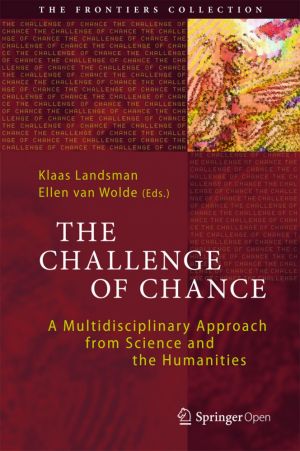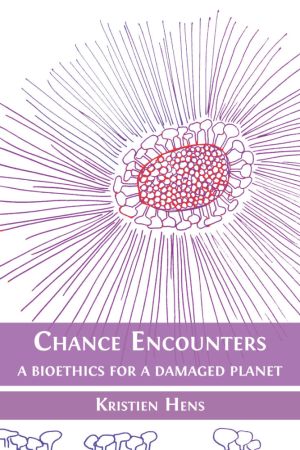Chance Encounters
A Bioethics for a Damaged Planet
by Kristien Hens
DescriptionTable of ContentsDetailsHashtagsReport an issue
Examining genetic research, biomedical ethics, autism research and the concept of risk, Hens illustrates that there is no 'universal' or 'neutral' state of scientific and clinical knowledge, and that attending to the situatedness of individual experience is essential to understand the world around us, to know its (and our) limitations, and to forge an ethical future.
Chance Encounters is aimed at a broad audience of researchers in bioethics, philosophy, anthropology, sociology, as well as biomedical and environmental scientists. It will also be relevant to policymakers, and the artwork by Christina Stadlbauer and Bartaku will be of interest to artists and writers working at the intersection of art and science. 






Book Description
In this rigorous and necessary book, Kristien Hens brings together bioethics and the philosophy of biology to argue that it is ethically necessary for scientific research to include a place for the philosopher. As well as ethical, their role is conceptual: they can improve the quality and coherence of scientific research by ensuring that particular concepts are used consistently and thoughtfully across interdisciplinary projects. Hens argues that chance and uncertainty play a central part in bioethics, but that these qualities can be in tension with the attempt to establish a given theory as scientific knowledge: in describing organisms and practices, in a sense we create the world. Hens contends that this is necessarily an ethical activity.Examining genetic research, biomedical ethics, autism research and the concept of risk, Hens illustrates that there is no 'universal' or 'neutral' state of scientific and clinical knowledge, and that attending to the situatedness of individual experience is essential to understand the world around us, to know its (and our) limitations, and to forge an ethical future.
Chance Encounters is aimed at a broad audience of researchers in bioethics, philosophy, anthropology, sociology, as well as biomedical and environmental scientists. It will also be relevant to policymakers, and the artwork by Christina Stadlbauer and Bartaku will be of interest to artists and writers working at the intersection of art and science.
This open book is licensed under a Creative Commons License (CC BY-NC-ND). You can download Chance Encounters ebook for free in PDF format (13.6 MB).
Table of Contents
Chapter 1
A Foundation for Bioethics: Van Rensselaer Potter's Legacy
Chapter 2
Overview of the Arguments
Chapter 3
Research Ethics all the Way Down
Chapter 4
Against Dualisms
Chapter 5
Development and Ethics
Chapter 6
A Dog Is a Dog Is a Dog: Of Nature and Values
Chapter 7
A Process Ontology for Bioethics
Chapter 8
Time, Culture and Creativity
Chapter 9
Symbiosis and Interdependency
Chapter 10
Medical Ethics and Environmental Ethics
Chapter 11
Diseases, Disorders, Disabilities, and Norms
Chapter 12
Standpoints
Chapter 13
Bringing Back the Environment
Chapter 14
Caring Responsibilities
Chapter 15
Unforgetting The Past
Chapter 16
A Creative and Forward-Looking Bioethics
Chapter 17
Concepts: Risks
Chapter 18
Development: Autism Research
Chapter 19
Trouble: Crocodiles and Mice
Chapter 20
Creativity: A Game Inspiring A Bioethicist
Book Details
Title
Chance Encounters
Subject
Science and Mathematics
Publisher
Open Book Publishers
Published
2022
Pages
268
Edition
1
Language
English
ISBN13
9781800648494
ISBN10
1800648499
ISBN13 Digital
9781800648517
ISBN10 Digital
1800648510
PDF Size
13.6 MB
License

Related Books

This book presents a multidisciplinary perspective on chance, with contributions from distinguished researchers in the areas of biology, cognitive neuroscience, economics, genetics, general history, law, linguistics, logic, mathematical physics, statistics, theology and philosophy. The individual chapters are bound together by a general introductio...

China and Russia are rising economic and political powers that share thousands of miles of border. Yet, despite their proximity, their practical, local interactions with each other - and with their third neighbour Mongolia - are rarely discussed. The three countries share a boundary, but their traditions, languages and worldviews are remarkably dif...

Conviviality has lately become a catchword not only in academia but also among political activists. This open access book discusses conviviality in relation to the adjoining concepts cosmopolitanism and creolisation. The urgency of today's global predicament is not only an argument for the revival of all three concepts, but also a reason to br...

Historians often assume a one-directional transmission of knowledge and ideas, leading to the establishment of spatial hierarchies defined as centres and peripheries. In recent decades, transnational and global history have contributed to a more inclusive understanding of intellectual and cultural exchanges that profoundly challenged the ways in wh...

In this truly unique technical book, today's leading software architects present valuable principles on key development issues that go way beyond technology. More than four dozen architects - including Neal Ford, Michael Nygard, and Bill de hOra - offer advice for communicating with stakeholders, eliminating complexity, empowering developers, ...

What is the impact of information and communication technologies (ICTs) on the human condition? In order to address this question, in 2012 the European Commission organized a research project entitled The Onlife Initiative: concept reengineering for rethinking societal concerns in the digital transition. This volume collects the work of the Onlife ...

